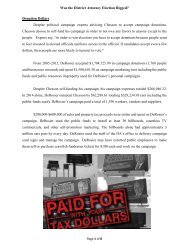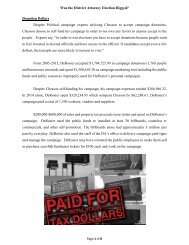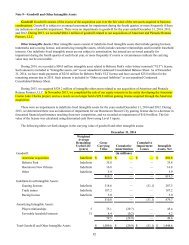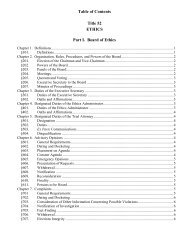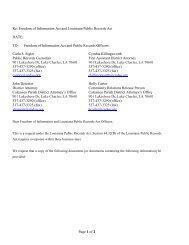- Page 1 and 2:
POLITICAL ILLUSIONS OF THE CAJUN MA
- Page 3 and 4:
TABLE OF CONTENTS 1. Political Illu
- Page 5 and 6:
TABLE OF CONTENTS c. Silver Star Ca
- Page 7 and 8:
TABLE OF CONTENTS 19. Single Issue
- Page 9 and 10:
TABLE OF CONTENTS ll. CPDA FOIA res
- Page 11 and 12:
Calcasieu Parish District Attorney
- Page 13 and 14:
In the article DeRosier said, “I
- Page 15 and 16:
During the prosecution of Chesson
- Page 17 and 18:
Killingsworth and her assistant are
- Page 19 and 20:
On November 21, 2015, Caldwell was
- Page 21 and 22:
P P P P several hours the scheduled
- Page 23 and 24:
• “Chesson was represented by c
- Page 25 and 26:
DeRosier and Paxton’s basis of th
- Page 27 and 28:
One day after the election and hour
- Page 29 and 30:
DeRosier and L’Auberge’s strong
- Page 31 and 32:
Carla Sigler is the Public Records
- Page 33 and 34:
2015. CPDA intentionally delayed ma
- Page 35 and 36:
The allegations made are very serio
- Page 37 and 38:
According to the 2014 Calcasieu Par
- Page 39 and 40:
defendant.” The evidence of retal
- Page 41 and 42:
P P P amendment: other officer prov
- Page 43 and 44:
Investigating further and it is app
- Page 45 and 46:
On February 20, 2015, a public reco
- Page 47 and 48:
The video records request was submi
- Page 49 and 50:
The 5-month old unsolved murder in
- Page 51 and 52:
Extortion A plea deal was made with
- Page 53 and 54:
was any criminal behavior or at-ris
- Page 55 and 56:
Shareholder Ethics In belief though
- Page 57 and 58:
Hurricane Rita (2005) caused damage
- Page 59 and 60:
Pinnacle reports that CEO Dan Lee r
- Page 61 and 62:
The FTC required Pinnacle to sell t
- Page 63 and 64:
Pinnacle used an un-identified spok
- Page 65 and 66:
and are initially recorded at cost.
- Page 67 and 68:
Page 1 of 410
- Page 69 and 70:
Page 3 of 410
- Page 71 and 72:
Page 5 of 410
- Page 73 and 74:
Page 7 of 410
- Page 75 and 76:
Page 10 of 410
- Page 77 and 78:
Derosier Campaign Summary Summary 2
- Page 85 and 86:
LOUISIANA RULES OF PROFESSIONAL CON
- Page 87 and 88:
RS 14:133 §133. Filing or maintain
- Page 89 and 90:
RS 14:134.2 §134.2. Malfeasance in
- Page 91:
RS 51:2256 §2256. Conspiracy to vi
- Page 94 and 95:
Page 23 of 410
- Page 96 and 97:
Page 25 of 410
- Page 98 and 99:
Attorney: Appeal court ruling vindi
- Page 100 and 101:
6/A6 A6 AMERICAN PRESS WEdNESdAy, A
- Page 102 and 103:
Search Home News Sports Outdoors Op
- Page 104 and 105:
PRLog - Global Press Release Distri
- Page 107:
LAW OFFICE OF CHRISTIAN D. CHESSON
- Page 130:
12 th Annual Christian D. Chesson C
- Page 133:
Journal of Criminal Law and Crimino
- Page 148 and 149:
Attorney General Ken Paxton Charges
- Page 150 and 151:
US SeNdiNg wArShip Iranian vessels
- Page 152:
Page 36 of 410
- Page 156 and 157:
Home • New Orleans • Press Rele
- Page 158 and 159:
Portfolio Media. Inc. | 860 Broadwa
- Page 160 and 161:
Page 42 of 410
- Page 162 and 163:
“It always seems to be a constant
- Page 164 and 165:
may call (800) 252-8011 [#] (for ca
- Page 166 and 167:
Grand Jury Indicts Texas Attorney G
- Page 168 and 169:
Grand Jury Indicts Texas Attorney G
- Page 170 and 171:
1469 Bribery of a candidate; crime
- Page 172 and 173:
RS 14:120 Corrupt influencing §120
- Page 174 and 175:
Page 54 of 410
- Page 176 and 177:
Page 56 of 410
- Page 178 and 179:
Page 62 of 410
- Page 180 and 181:
Page 58 of 410
- Page 182 and 183:
Page 60 of 410
- Page 184 and 185:
Page 64 of 410
- Page 186 and 187:
Page 66 of 410
- Page 188 and 189:
Page 68 of 410
- Page 190 and 191:
Page 70 of 410
- Page 192 and 193:
Page 72 of 410
- Page 194 and 195:
Page 74 of 410
- Page 196 and 197:
Page 76 of 410
- Page 198 and 199:
Page 78 of 410
- Page 200 and 201:
Page 80 of 410
- Page 202 and 203:
RS 18:1465 Prohibited use of public
- Page 204 and 205:
RS 14:134.3 §134.3. Abuse of offic
- Page 206 and 207:
RS 18:1463 §1463. Political materi
- Page 208 and 209:
RS 18:1463 §1463. Political materi
- Page 210 and 211:
Page 90 of 410
- Page 212 and 213:
DA's Office Billboards Paid for by
- Page 214 and 215:
DA's Office Billboards Paid for by
- Page 216 and 217:
DA's Office Billboards Paid for by
- Page 218 and 219:
Information from invoice copies pro
- Page 220 and 221:
Information from invoice copies pro
- Page 222:
Information from invoice copies pro
- Page 225 and 226:
Page 105 of 410
- Page 227 and 228:
Page 107 of 410
- Page 229 and 230:
Page 109 of 410
- Page 231 and 232:
Page 111 of 410
- Page 233 and 234:
Page 113 of 410
- Page 235 and 236:
Page 115 of 410
- Page 237 and 238:
Page 117 of 410
- Page 239 and 240:
Page 119 of 410
- Page 241 and 242:
Officer: JAMES FOSTER DEROSIER Titl
- Page 243 and 244:
Domicile, Agent Change or Resign of
- Page 245:
City, State, Zip: LAKE CHARLES, LA
- Page 251 and 252:
PRLog - Global Press Release Distri
- Page 253 and 254:
PRLog - Global Press Release Distri
- Page 255 and 256:
John Derosier Campaign Donations Fr
- Page 257 and 258:
Page 129 of 410
- Page 259:
Page 131 of 410
- Page 262 and 263:
Page 134 of 410
- Page 264 and 265:
RS 18:1463 §1463. Political materi
- Page 266 and 267:
Digital Billboard Screen (on left)
- Page 268 and 269:
Page 141 of 410
- Page 270 and 271:
VI. Contribution Limits (R.S. 18:15
- Page 272 and 273:
John Derosier 2005 Primary: Nov 12,
- Page 274 and 275:
John Derosier 2005 Primary: Nov 12,
- Page 276 and 277:
the value of the goods or services
- Page 278 and 279:
Plea Deal System Elected Official J
- Page 280 and 281:
Page 153 of 410
- Page 282 and 283:
Page 155 of 410
- Page 284 and 285:
Page 157 of 410
- Page 286 and 287:
VII. Prohibited Practices (R.S. 18:
- Page 288 and 289:
Page 161 of 410
- Page 290 and 291:
Page 163 of 410
- Page 292 and 293:
Page 165 of 410
- Page 294 and 295:
Page 167 of 410
- Page 296 and 297:
John Derosier Campaign Expenses Fir
- Page 298 and 299:
John Derosier Campaign Expenses Gif
- Page 300 and 301:
John Derosier Campaign Expenses Gif
- Page 302 and 303:
John Derosier Campaign Expenses Flo
- Page 304 and 305:
FBI launches campaign to root out p
- Page 306 and 307:
Mayor Will Sessoms is under investi
- Page 308 and 309:
Media Manipulation law and legal de
- Page 310 and 311:
§ 1986 TITLE 42—THE PUBLIC HEALT
- Page 312 and 313:
00904881 silver stAr recipient Fall
- Page 314 and 315:
Page 185 of 410 Page 1 of 11
- Page 316 and 317:
Page 187 of 410 Page 3 of 11
- Page 318 and 319:
Page 189 of 410 Page 5 of 11
- Page 320 and 321:
Page 191 of 410 Page 7 of 11
- Page 322 and 323:
Page 193 of 410 Page 9 of 11
- Page 324 and 325:
Page 195 of 410 Page 11 of 11
- Page 326 and 327:
Page2 FREEDOM OF INFORMATION ACT RE
- Page 328 and 329:
Page 199 of 410
- Page 330 and 331:
Page 203 of 410
- Page 332 and 333:
Page 202 of 410
- Page 334 and 335:
Page 205 of 410
- Page 336 and 337:
Common knowledge that District Atto
- Page 338 and 339:
Page 209 of 410 Page 2 of 2
- Page 340 and 341:
Common knowledge that District Atto
- Page 342 and 343:
Common knowledge that District Atto
- Page 344 and 345:
Common knowledge that District Atto
- Page 346 and 347:
Page 217 of 410 Page 3 of 5
- Page 348 and 349:
Page 219 of 410 Page 5 of 5
- Page 351 and 352:
Page 221 of 410
- Page 353 and 354:
Page 223 of 410
- Page 355 and 356:
Page 225 of 410
- Page 357 and 358:
Page 227 of 410
- Page 359 and 360:
50/50 Thursdays Coca Cola Restauran
- Page 361 and 362:
Page 231 of 410
- Page 363 and 364:
Page 233 of 410
- Page 365 and 366:
Page 235 of 410
- Page 367 and 368:
Page 237 of 410
- Page 369 and 370:
Page 239 of 410
- Page 371 and 372:
Page 241 of 410
- Page 373 and 374:
Page 243 of 410
- Page 375 and 376:
Page 245 of 410
- Page 377 and 378:
Page 247 of 410
- Page 379 and 380:
Page 249 of 410
- Page 381 and 382:
Page 251 of 410
- Page 383 and 384:
Page 253 of 410
- Page 385 and 386:
Page 255 of 410
- Page 387 and 388:
CYNTHIA KILLINGSWORTH FIRST ASSISTA
- Page 389 and 390:
SECOND ATTEMPT RE: PUBLIC RECORDS R
- Page 392 and 393:
I. Employment information regarding
- Page 394 and 395:
Palermo Timeline Summary.xlsx Prose
- Page 396 and 397:
Palermo Timeline Summary.xlsx Prose
- Page 398 and 399:
Sulphur businessman Palermo arreste
- Page 400 and 401:
Palermo pleads not guilty to charge
- Page 402 and 403:
Palermo in court fighting criminal
- Page 404 and 405:
Sulphur businessman Joseph Palermo
- Page 406 and 407:
State waits to examine seized mater
- Page 408 and 409:
Judge throws out four charges again
- Page 410 and 411:
DA's office wants judge recused fro
- Page 412 and 413:
41919 Deals Business Spotlight Cont
- Page 414 and 415:
RS 18:402 Dates of primary and gene
- Page 416 and 417:
CONST 10 9 Prohibitions Against Pol
- Page 418 and 419:
RS 33:4344 §4344. Notice of electi
- Page 420 and 421:
proposition shall not exceed two hu
- Page 422 and 423:
Page 264 of 410
- Page 424 and 425:
Page 266 of 410
- Page 426 and 427:
Page 268 of 410
- Page 428 and 429:
Page 270 of 410
- Page 430 and 431:
Page 272 of 410
- Page 432:
Page 274 of 410
- Page 442:
1. Call to order and roll call. PRE
- Page 457 and 458:
wednesday february 18, 2015 aMerICa
- Page 459 and 460:
Students hurt in bus crash; some pa
- Page 461 and 462:
1/A1 KnOx CLEARED Italy’s high co
- Page 463 and 464:
1/A1 Difficult negotiationS Stickin
- Page 465 and 466:
B8 AMERICAN PRESS ThuRSdAy, APRIl 9
- Page 467 and 468:
American Press - Home Page 1 of 2 S
- Page 469 and 470:
americanpress.com Public defender s
- Page 472 and 473:
Page 276 of 410
- Page 474 and 475:
Page 278 of 410
- Page 476 and 477:
Lake Charles Casino Timeline Date A
- Page 478:
Note 9—Goodwill and Other Intangi
- Page 481 and 482:
Page 284 of 410
- Page 483 and 484:
Page 288 of 410
- Page 485:
Page 290 of 410
- Page 488 and 489:
Page 293 of 410
- Page 490 and 491:
As with any industry, competition a
- Page 492 and 493:
(“River City”), opened in March
- Page 494 and 495:
Page 299 of 410
- Page 496 and 497:
Page 301 of 410
- Page 498 and 499:
IV. THE RELEVANT SERVICE MARKET 46.
- Page 500 and 501:
58. Respondents focus their competi
- Page 502 and 503:
Page 307 of 410
- Page 504 and 505:
COUNT II - ILLEGAL ACQUISITION 78.
- Page 520 and 521:
5'19/2015 Pinnacle in discussions a
- Page 522:
Equity Grants to Employees of Ameri
- Page 525 and 526:
About Pinnacle Entertainment
- Page 527 and 528:
6/A6 A6 AMERICAN PRESS SuNdAy, JuNE
- Page 529 and 530:
6/A6 A6 AMERICAN PRESS FRIdAy, JuNE
- Page 531 and 532:
6/A6 A6 AMERICAN PRESS TuESdAy, MAy
- Page 533 and 534:
5/A5 By Johnathan Manning jmanning@
- Page 535 and 536:
5/A5 By Johnathan Manning jmanning@
- Page 537 and 538:
3/A3 00888775 EBOLA con
- Page 539 and 540:
6/A6 A6 AMERICAN PRESS ThuRSdAy, SE
- Page 541 and 542:
RE: PUBLIC RECORDS REQUEST DECEMBER
- Page 547:
8. Provide all complaints and law s
- Page 550 and 551:
Patriots of even talking about a dr
- Page 552 and 553:
Operation 27 Summary of Charges and
- Page 554 and 555:
Operation 27 Summary of Charges and
- Page 556:
Calcasieu Parish Sheriff's Office T
- Page 559:
RE: PUBLIC RECORDS REQUEST DECEMBER
- Page 570 and 571:
In order to help to determine my st
- Page 587 and 588:
RE: PUBLIC RECORDS REQUEST January
- Page 589 and 590:
RE: PUBLIC RECORDS REQUEST Page 1 o
- Page 594:
In order to help to determine my st
- Page 601 and 602:
28; Rawlyn James Antoine, 37; Willi
- Page 603 and 604:
CYNTHIA KILLINGSWORTH FIRST ASSISTA
- Page 605:
H. LYNN )ONES, II Clerk of Court an
- Page 608 and 609:
H. LYNN JONES, II Clerk of Court an
- Page 610 and 611:
The allegations are very serious fe
- Page 612 and 613:
In order to help to determine my st
- Page 614 and 615:
The allegations are very serious fe
- Page 616 and 617:
In order to help to determine my st
- Page 618 and 619:
The DA’s delayed letter also note
- Page 620 and 621:
In order to help to determine my st
- Page 622 and 623:
50/50 Thursdays Coca Cola Restauran
- Page 624 and 625:
Jerry Vallier (50 yrs) of Lake Char
- Page 626:
Xero Accounting Software Loved by 6
- Page 631 and 632:
CYNTHIA KILLINGSWORTH FIRST ASSISTA
- Page 633 and 634:
RE: PUBLIC RECORDS REQUEST JANUARY
- Page 635 and 636:
In other words, deciding whether if
- Page 637:
1. Local Veteran Marine request rec
- Page 641 and 642:
.., CAUTION NOT'TO BE USED FOR IDEN
- Page 643 and 644:
Letter Page 1 of2 DEPARTMENT OF VET
- Page 646 and 647:
Veterans Court will help rehab vets
- Page 649 and 650:
Re: KPLC titles John Derosier "Home
- Page 651 and 652:
fRom PAgE A1 l LoCAL Carnival rides
- Page 653 and 654:
Shreveport Louisiana Gov. Jindal si
- Page 655 and 656:
Louisiana Gov. Bobby Jindal signs l
- Page 657 and 658:
CYNTHIA KILLINGSWORTH FIRST ASSISTA
- Page 659 and 660:
RE: PUBLIC RECORDS REQUEST November
- Page 661 and 662:
2014 Regular Session Sequence: 1535
- Page 663 and 664:
SB NO. 532 ENROLLED incidence of al
- Page 665 and 666:
SB NO. 532 ENROLLED (2) "Veteran" m
- Page 667 and 668:
SB NO. 532 ENROLLED determines that
- Page 669 and 670:
SB NO. 532 ENROLLED and benefit fro
- Page 671 and 672:
SB NO. 532 ENROLLED guilty to the c
- Page 673 and 674:
SB NO. 532 ENROLLED the program. (c
- Page 675 and 676:
SB NO. 532 ENROLLED to cumulation o
- Page 677 and 678:
SB NO. 532 ENROLLED (3) DD-217 Disc
- Page 679 and 680:
SB NO. 532 ENROLLED citation: * * *
- Page 681 and 682:
Search Home News Sports Outdoors Op
- Page 695 and 696: Re: Video Records Request OCTOBER 7
- Page 697 and 698: Hi Mari, I am following up with you
- Page 700 and 701: 1/A1 Stepping ASide Shinseki resign
- Page 702 and 703: 1/A1 kErry IN afghaNIStaN U.S., all
- Page 704 and 705: 1/A1 Command Contention Does presid
- Page 706 and 707: 3/A3 By Johnathan Manning jmanning@
- Page 708 and 709: 3/A3 JENNINgS Continued from A2 D
- Page 711: In order to help to determine my st
- Page 714 and 715: CYNTHIA KILLINGSWORTH FIRST ASSISTA
- Page 720 and 721: CYNTHIA KILLINGSWORTH FIRST ASSISTA
- Page 722 and 723: 5. Have any person made complaints
- Page 724: Embattled Angola warden Burl Cain t
- Page 727 and 728: Former St. Tammany DA Walter Reed i
- Page 729: Former St. Tammany DA Walter Reed i
- Page 733 and 734: Texas Attorney General Ken Paxton I
- Page 735 and 736: Former DA Walter Reed and son indic
- Page 737 and 738: Get Social With Us! Most Popular Em
- Page 739 and 740: Search Home News Sports Outdoors Op
- Page 741: Want to read more? Subscribe Now or
- Page 745 and 746: Stevedores’ attorneys claim the c
- Page 747 and 748: Red-light camera fight gets new lif
- Page 749 and 750: Page 312 of 410
- Page 751 and 752: Page 314 of 410
- Page 753 and 754: Page 316 of 410
- Page 755 and 756: Page 318 of 410
- Page 757 and 758: Page 320 of 410
- Page 759 and 760: Page 322 of 410
- Page 761 and 762: Page 324 of 410
- Page 763 and 764: Page 326 of 410
- Page 765 and 766: Page 328 of 410
- Page 767 and 768: Page 330 of 410
- Page 769 and 770: Page 332 of 410
- Page 771 and 772: Page 334 of 410
- Page 773 and 774: Page 336 of 410
- Page 775 and 776: Page 338 of 410
- Page 777 and 778: Page 340 of 410
- Page 779 and 780: Page 342 of 410
- Page 781 and 782: Page 344 of 410
- Page 783 and 784: Page 346 of 410
- Page 785 and 786: Page 348 of 410
- Page 787 and 788: Page 350 of 410
- Page 789 and 790: Page 352 of 410
- Page 791 and 792: Page 354 of 410
- Page 793 and 794:
Page 356 of 410
- Page 795 and 796:
Page 358 of 410
- Page 797 and 798:
Page 360 of 410
- Page 799 and 800:
Page 362 of 410
- Page 801 and 802:
Page 364 of 410
- Page 803 and 804:
Page 366 of 410
- Page 805 and 806:
Page 368 of 410
- Page 807 and 808:
Page 370 of 410
- Page 809 and 810:
Page 372 of 410
- Page 811 and 812:
Page 374 of 410
- Page 813 and 814:
Page 376 of 410
- Page 815 and 816:
Page 378 of 410
- Page 817 and 818:
Page 380 of 410
- Page 819 and 820:
Page 382 of 410
- Page 821 and 822:
Page 384 of 410
- Page 823 and 824:
Page 386 of 410
- Page 825 and 826:
Page 388 of 410
- Page 827 and 828:
Page 390 of 410
- Page 829 and 830:
Page 392 of 410
- Page 831 and 832:
Page 394 of 410
- Page 833 and 834:
Page 396 of 410
- Page 835 and 836:
Page 398 of 410
- Page 837 and 838:
Page 400 of 410
- Page 839 and 840:
Page 402 of 410
- Page 841 and 842:
Page 404 of 410
- Page 843 and 844:
Page 406 of 410
- Page 845 and 846:
Page 408 of 410
- Page 847:
Page 410 of 410





